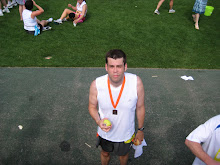I read a Michael Chabon novel after finishing his book of essays (Maps and Legends). The novel in question was The Final Solution. Novella might be a more appropriate term--it was pretty short.
It was pretty good. An ancient Sherlock Holmes, obviously in his last days, helps a young boy German Jew, displaced by the second World War, to find his stolen parrot. As stories go, it shows what you can achieve by not over explaining the plot. Chabon refuses to explicate everything for us; instead we, as readers, have to participate in making some sense out of the novella's events. Combined with the elaborate descriptions, the result is feeling like you are actually present for the story. And not in that irritating way that I've seen in some recent novels, where you get the feeling the author has one eye on a film option as they are typing (The Historian, I'm looking in your direction). I don't mean that you see the action, but rather you feel like you are present for it. Considering that one chapter is in the third person limited perspective of a parrot, this is a trick.
Some of the things that I found mildly annoying about the novel can actually be excused because of this. Chabon, for instance, refuses to name Holmes, instead referring to him as the 'old man' and forcing the reader to deduce who the old man actually is. I couldn't decide if I found that little feature annoying or charming. I settled on teasing after awhile. And some of the prose--when describing certain physical details--felt a little overwritten. Adjective happy, I might say, if it was handed to me in an undergraduate paper. But as I think about the overall effect I think I see what Chabon was going for. The overall result--the intense physical descriptions, the refusal to interpret events and plot points, even the coyness over the name of a central character--is that you are thrust into the novel's action, much like you are thrown into life. You are bombarded with sense detail and forced to make a coherent interpretation of it. Considering the vocation of the main character, this seems appropriate.
Subscribe to:
Post Comments (Atom)

No comments:
Post a Comment